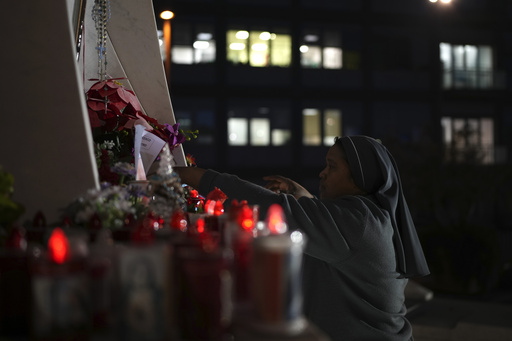
ROME — Pope Francis is currently in a critical medical state after experiencing a severe respiratory crisis linked to pneumonia and a complex lung infection, according to an announcement from the Vatican. The 88-year-old pontiff remains awake and requires “high flows” of oxygen to assist with his breathing. Furthermore, medical personnel have conducted blood transfusions due to his low platelet count, which is essential for blood clotting.
As stated in the Vatican’s latest update on his health, the pope’s situation is still deemed critical, marking the first time such terminology has been used in official communications regarding his condition since his hospitalization on February 14. Despite these challenges, the pope has remained alert and has been spending time seated in an armchair, although he has expressed experiencing more pain than the previous day. Doctor assessments regarding his prognosis remain cautious and are described as “reserved.”
Given Pope Francis’ age and existing lung issues, medical professionals have stated that his situation could be precarious. They have noted that the primary risk for the pope at this moment is the potential development of sepsis, a life-threatening condition caused by a serious blood infection that can arise as a complication of pneumonia. Thankfully, as of Friday, there were no indicators of sepsis present in his system, and he has shown a positive response to the medications he is receiving.
Recent blood tests revealed that the pope has developed a low platelet count, a condition identified as thrombocytopenia. Platelets play a crucial role in blood clotting, and their decline can stem from various factors, including medication side effects or underlying infections, as outlined by health experts.
Having a history of chronic lung disease and susceptibility to bronchitis, Pope Francis was admitted to Gemelli Hospital on February 14 after a one-week battle with worsening bronchitis. Initially, doctors diagnosed him with a complex infection involving viral, bacterial, and fungal elements affecting his respiratory tract, which later led to pneumonia in both lungs. The treatment regimen includes a strict requirement for rest, along with the administration of both cortisone and antibiotics, supplemented by oxygen as needed.
Dr. Sergio Alfieri, who leads the medical team at the hospital, emphasized that the greatest risk for Pope Francis is the possibility of germs in his respiratory system entering the bloodstream, which could lead to sepsis. The implications of such a condition can be dire, especially considering the pope’s age and existing health issues. Dr. Alfieri further indicated that the pope is aware of the gravity of his situation and has requested that this message be conveyed to the public.
In light of the recent health updates, speculation surrounding the pope’s potential resignation has stirred within the Vatican. In response, the Catholic Church hierarchy has actively sought to quell rumors about the pope stepping down. There are no established protocols in canon law for scenarios where a pope may become incapacitated. Nevertheless, Pope Francis has indicated that he has prepared a resignation letter intended for use in the event he is unable to make such decisions due to health concerns. Currently, the pontiff remains alert, engaging in meals and work.
Cardinal Pietro Parolin, the Vatican secretary of state, recently addressed these rumors during an interview, asserting that the health of Pope Francis should take precedence over speculation regarding his resignation. An unusual media report alleging that Cardinal Parolin and the chief canonist visited the pope in secret prompted a formal denial from the Vatican. Cardinal Parolin remarked that while such rumors can be expected in these circumstances, the focus should remain on Pope Francis’ healing and eventual return to normal duties.
In the realm of political circles, a spokesperson from the White House stated that President Trump has been informed about the pope’s condition and is preparing a statement of support. The spokesperson expressed that they are “praying for the pope.”
Furthermore, deacons have gathered at the Vatican to celebrate a special Holy Year weekend, which the pope unfortunately could not attend due to his health. The pontiff’s illness coincided with the commencement of this significant event in Catholicism, where he was scheduled to honor the deacons. As a result, the Holy Year organizer will lead this weekend’s Mass, marking a second consecutive weekend where the pope has been unable to deliver his customary Sunday blessing.
Despite the absence of the pope, attendees expressed that he is deeply missed but remains in their thoughts and prayers. Luis Arnaldo López Quirindongo, a deacon visiting the Vatican, encapsulated this sentiment, stating that while the pope may not be physically present, he is spiritually with them, and their prayers unite in support of his recovery.

